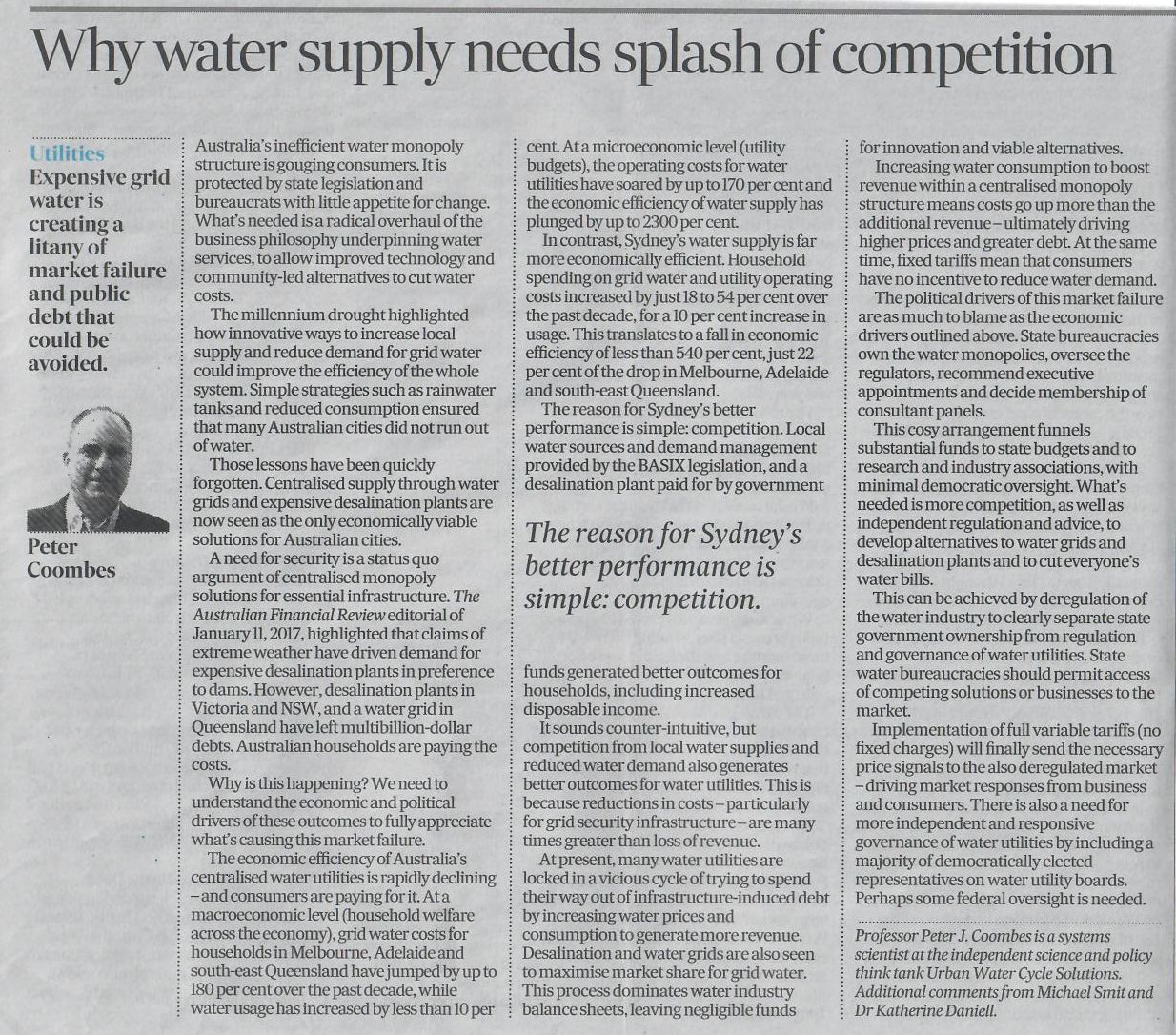“A perception that nothing else works is a result of not counting the full costs or impacts of sole reliance on centralised solutions,” wrote Dr. Peter Coombes, Australian water champion
Note to Reader:
Formerly a Chief Scientist for the State of Victoria (Australia), Dr. Peter Coombes is a water advisor to all levels of governments in Australia. An outside-the-pipe thinker, he is pioneering applications of a “whole-systems approach” to urban, rural and natural water cycle management.
His mission is to find optimum solutions for the sustainable use of ecosystem services, provision of infrastructure and urban planning. The work of Dr. Coombes is compelling in the ways his research and findings challenge conventional thinking.
He is a peer advisor to the Partnership for Water Sustainability in British Columbia, with a working relationship that dates back to 2001.
Peter Coombes reports that Australia’s inefficient water monopoly structure is gouging consumers!
Two keynote presentations in Australia by Kim Stephens, Executive Director with the Partnership for Water Sustainability in BC, over a 15-year period have provided him with an informed basis for comparing the guiding philosophy for water management in British Columbia versus that in Australia.
 In 2016, his preparation for the keynote address involved interviewing a cross-section of “water thought leaders” from across Australia. These conversations helped him to identify over-arching themes.
In 2016, his preparation for the keynote address involved interviewing a cross-section of “water thought leaders” from across Australia. These conversations helped him to identify over-arching themes.
“In Australia, water is managed as a private commodity owned by government monopolies. The Australian situation has profound implications for consumers as described in the article by Dr. Peter Coombes. In BC, we think very differently. We view water as a common good,” observed Kim Stephens.
Water supply needs a splash of competition
“Australia’s inefficient water monopoly structure is gouging consumers,” wrote Peter Coombes in an opinion piece published the Australian Financial Review newspaper.
“It is protected by state legislation and bureaucrats with little appetite for change. What’s needed is a radical overhaul of the business philosophy underpinning water services, to allow improved technology and community-led alternatives to cut water costs.”
A Synopsis for British Columbians:
To inform the Partnership for Water Sustainability’s e-newsletter readers, Dr. Coombes explains that:
“ I have analysed ‘big data’, from a systems perspective, to show there are substantial uncounted costs and benefits in a ‘centralist’ (traditional water engineers, economists and researchers) assessment. This omission that ensures that nothing else works.”
I have analysed ‘big data’, from a systems perspective, to show there are substantial uncounted costs and benefits in a ‘centralist’ (traditional water engineers, economists and researchers) assessment. This omission that ensures that nothing else works.”
“They do this by not fully counting the costs or impacts of centralized solutions, assuming no benefits of alternative solutions, only focusing on value of infrastructure rather than value to society, and assuming the poorest possible performance of alternatives.”
“However, the true answer is profound – the distributed alternative solutions work very well with the grid of traditional infrastructure to produce overall better answers across the whole of society – including for the water company.”
Water Utilities are Locked in a Vicious Debt Cycle
“The millennium drought highlighted how innovative ways to increase local supply and reduce demand for grid water could improve the efficiency of the whole system,” wrote Peter Coombes in the article for the Australian Financial Review.
“Those lessons have been quickly forgotten. Centralised supply through water grids and expensive desalination plants are now seen as the only economically viable solutions for Australian cities.”
“The economic efficiency of Australia’s centralised water utilities is rapidly declining – and consumers are paying for it.”
“The political drivers of this market failure are as much to blame as the economic drivers. State bureaucracies own the water monopolies, oversee the regulators, recommend executive appointments and decide membership of consultant panels. This arrangement funnels substantial funds to State budgets and to research and industry associations, with minimal democratic oversight.”
Michigan State University finds similar outcomes and predicts that the percentage of U.S. households who will find water bills unaffordable could triple from 12% to 36%” over the next five years.
To Download the Article:
Click on Why water supply needs a splash of competition
About Dr. Peter Coombes
Systems Thinker, scientist, engineer, Problem Solver and policy analyst. Provider of alternative perspective. Independent.
Dr Coombes has spent more than 30 years dedicated to the development of systems understanding of the urban, rural and natural water cycles with a view to finding optimum solutions for the sustainable use of ecosystem services, provision of infrastructure and urban planning.
He has been involved in a wide range of projects, advised many clients and governments, providing strategic design, policy and economic advice to the satisfaction of governments and society.




